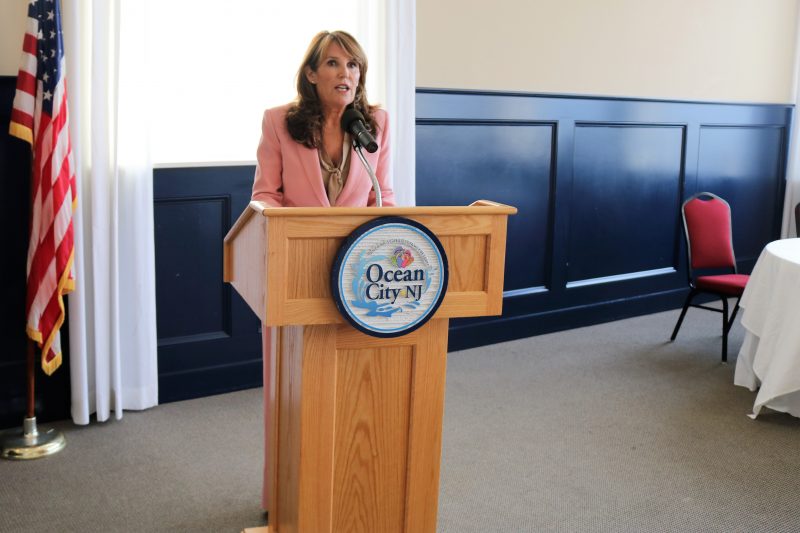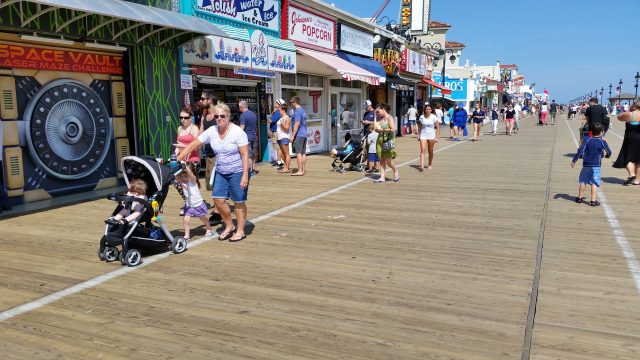By Tim Kelly
New Jersey’s push to increase the state’s minimum wage, signed into law Monday by Gov. Phil Murphy, could certainly help some workers.
However, the collateral damage from the move could also have a devastating effect on the overall economy of the state and actually hurt many workers, and local economies, opponents maintain.
Higher prices, less service, reduced or eliminated employment opportunities and shuttered businesses are a few of the pitfalls predicted by business advocacy groups, chambers of commerce and local business owners. Included on the opposition side are many in Ocean City.
Legislation to raise the hourly minimum wage approximately 70 percent to $15 per hour previously passed the state Assembly and Senate and the governor made it official by adding his signature at a crowded and raucous meeting hall in Elizabeth.
Union officials and supporters of the raise cheered wildly, while opponents jeered and hissed. The governor, who fulfilled one of his top campaign promises with the bill’s passage, grinned, waved and blew kisses in the direction of the crowd.
Boosters of the law believe business will increase in the state because people will have more income, many will be lifted from poverty, and increased spending will revitalize the state’s economy.
“This is a huge step forward for… workers to be able to more capably provide for themselves and their families,” NJ.com quoted Murphy as saying.

The law calls for a five-year phase-in for most businesses. However, exclusions fought for by seasonal resort towns including Ocean City, Atlantic City and environs, and municipalities represented by the Cape May County Chamber resulted in some exclusion from the version first proposed by Murphy and Democrats in both the Assembly and Senate, a flat $15 minimum wage for everyone. It was to be phased in with scheduled increases over the next five years.
Under the deal worked out with opponents of the law, the timetable to phase in the increase is extended for businesses employing seasonal workers, and workers at businesses that employ fewer than six employees.
Under the terms of the deal, most employees will increase from the current $8.85 minimum to $10 on July 1 – less than four months from today. It will then rise to $11 on Jan. 1, 2020; $12 an hour the following Jan. 1, $13 per hour Jan. 1, 2022, $14 in 2023 and $15 in 2024.
An exemption for seasonal workers, which Senate President Steve Sweeney and local legislators fought for, allowed the total raise to be installed by 2026. The same timeframe applies to businesses with less than six employees.
Farm workers remained one group which is not assured to reach the top $15 figure in the pay raise. The law calls for an increase to $12.50 an hour in 2024, and it will be left up to the executive branch of the government to decide whether or not to continue the increases up to $15 per hour by 2027.

Prior to Murphy’s signing the bill into law, local business advocates were vocal in their opposition.
“This is a game-changer,” said Michele Gillian, executive director of the Ocean City Regional Chamber of Commerce. “This really amounts to another tax in a state already overtaxed and over-regulated. In order to survive, some businesses will have to pass the cost along or cut services to make up for it.”
The small compromise in the final law is of little solace for the small business already struggling to survive in some cases, business representatives said. Some mocked the state’s definition of a “small business” as one with six employees or less.
“The minimum wage is for entry-level, non-skilled employees. It isn’t intended to be a living wage,” said Jon Talese, a proprietor of Jon and Patty’s Coffee Bar and Bistro, and a spokesperson for the Downtown Merchants Association in Ocean City.
“We (at Jon and Patty’s) compensate our employees for the skills they bring to the job,” he said. “We’ve never paid our employees (just the) minimum wage, and we’ve been around for 10 years.”
“I would understand it more if (Murphy and the Legislature) explained what they based the $15 figure on,” Talese continued. “They haven’t explained if it is to keep pace with the cost of living or any other factor. They just came up with a number. They’re putting the burden on small businesses that can least afford it.”

Talese’s association represents the more than 100 small shops, restaurants and cafes located mostly along Asbury Avenue and a few side streets between 6th and 14th streets. The downtown shopping district is a major drawing card for visitors, and a prominent focus of Ocean City’s marketing and promotional efforts.
Another merchants group, which represents Boardwalk stores and shops, also strongly opposes the wage hike. Boardwalk Merchants Association representatives could not be reached in time for inclusion in this article.
But Gillian believed all of the merchants groups agreed with the Chamber’s position earlier Monday.
“Our downtown and Boardwalk shopping is something that makes Ocean City unique,” Gillian said. “If you put more financial pressures on some of them, some won’t be able to survive. You will end up with nothing but chain stores and businesses. You’ll take away that uniqueness, limit the options for shoppers and take away part of our identity.”
The Chamber communicated with all of its 550-plus members and urged them to voice their opposition to the bill as reportedly proposed. Members were given sample letters and the addresses of legislators representing them.
According to an internet posting, the Chamber in 2016 contacted then-Gov. Chris Christie and then-Lt. Gov. Kim Guadagno, then-Congressman Frank LoBiondo, then-state Sen. Jeff Van Drew, who is now a congressman, then-Assemblyman Bob Andrzejczak, who is now a senator, and Assemblyman Bruce Land, encouraging the lawmakers to not support the wage increase.
“We believed then, as still believe now it will severely hurt small businesses,” the Chamber memo stated.
It went on to say that Chamber representatives met more recently with Van Drew and Sweeney to discuss and consider the minimum wage issue and its potentially disastrous effects to the small business community in Ocean City, other shore towns and all over the state.
“Now more than ever we need to continue expressing our opposition. We will continue to voice our concerns …” the statement said. It went on to urge members to write elected officials “to let them know this is bad for business and our tourism economy. Together, we can we can make our voices heard.”

Ocean City was not alone in its opposition. The Cape May County Chamber of Commerce and the New Jersey Business and Industry Association also opposed the law and urged members to lobby against it.
Atlantic County Republican state Sen. Chris Brown had already publicly opposed the bill and voted against it. He predicted its passage “will end up hurting the very families it is supposed to help,” according to a statement his office released last week.
New Jersey joined New York, California and Massachusetts as the fourth state to enact a $15 per hour minimum wage hike. These states are among the most expensive to live in, proponents say.
On the other hand, critics claim the law is also an acknowledgement the economies of these states are not doing well enough to support naturally-occurring wage increases.
In published reports, Sweeney said he would reserve the right to propose changes to the law “if there are unintended consequences.”
Published reports said a provision to freeze or slow the timetables in the event of a severe economic downturn or natural disaster, and to widen the scope of groups exempted from the law was rejected. Teenage workers, for example, were originally to be excluded from the law. However, workers 18 and over are on the road to $15 per hour under the general timeframe.
“They are legislating (against) people’s lives,” Jon Talese said on Monday. “The young person hoping for a job on the Boardwalk to work and help pay for his or her college education, the people looking to help their families to make it, will, in some cases lose the opportunity to do that.”
Gilligan concurred. “Ocean City’s economy is dependent on seasonal workers,” she said. “Young people working on the Boardwalk or around town won’t just have the opportunity to earn money (at the new minimum wage).”
“In addition to the money, they will lose out on valuable life lessons: being part of a team, working, talking and relating with people, the value of money and much more,” Gillian added. “This law, no matter how well-intentioned, is going to take much of that away.”






